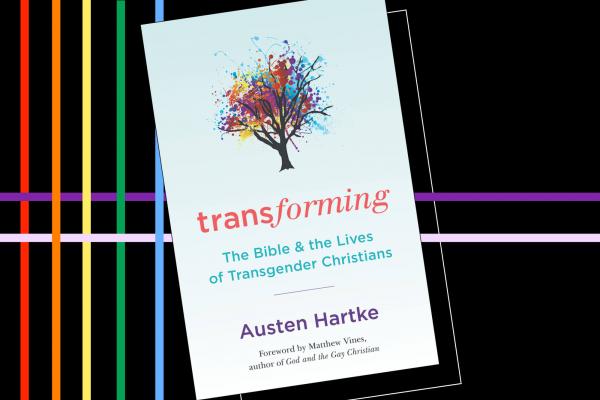I’VE RECENTLY become acquainted with someone who is locked up in one of California’s 35 state prisons. This person also happens to identify as gay and Christian. Despite years of being told he was an abomination during his Southern Baptist upbringing, somehow my friend has managed to hold onto his love of Jesus. In one of his letters, he wrote, “I am annoyed by the attitude that says, ‘If you’re gay, it’s okay because God forgives you,’” pointing to the assumption that gayness is inherently sinful and needs to be forgiven.
This is an important intervention made by author Austen Hartke as well, as the final chapter of Transforming: The Bible and the Lives of Transgender Christians asserts the need to move “beyond apologetics” and toward theology that not only tolerates trans identity but also embraces trans people as part of the beauty and diversity of God’s creation. Moving beyond apologetics also means moving toward theologies that are written by and for trans people, listening for our unique wisdom and insights, and making changes to church policies and procedures to become more fully inclusive and loving of trans people.
Hartke has some very practical ideas for how faith communities can start doing this work, which he shares in this useful primer on trans Christianity that goes beyond “Gender & Sexuality 101.” Weaving biblical examples of gender nonconformity and transformation with the stories and voices of contemporary trans Christians, Hartke’s approach is both pastoral and prophetic as he addresses harmful Christian theology that has been used to further marginalize and exclude trans people. Hartke’s scriptural basis for a trans-affirming theology offers a healing balm for queer and trans people who have ever questioned that God loves them based on “what it says in the Bible,” while challenging progressive Christian communities to center trans perspectives in their efforts to become truly open and affirming.
Giving voice to diverse trans people reflecting on their relationships to faith, scripture, and Christian community, Hartke disavows the reader of any preconceived notion of a universal trans experience and reveals the intersections of white supremacy, capitalism, heterosexism, patriarchy, and colonialism that impact each of our lives differently, depending on our relationship to these systems of domination.
As of this writing, at least 12 trans women have been murdered in the U.S. in 2018. The Trump administration recently announced plans to roll back protections for trans prisoners in federal lockup. Many trans people struggle to access basic health care or even public restrooms without fear of violence or harassment. Hartke’s trans-affirming theology couldn’t be timelier for ministry professionals seeking to build beloved community by and for people who have been consistently pushed to the margins.
As a gender-nonconforming queer person and lay minister in Christian communities, I have experienced the liberatory and healing potential of moving beyond apologetics toward a future that recognizes and celebrates each person’s unique gender identity and expression. This liberation is felt not only by queer and trans people in my communities but also by people who identify as cisgender and straight. When queer and trans people are not expected to justify or apologize for our very existence, everyone in the community benefits from a greater freedom to live into the singular and unique person God is calling them to be.
Hartke’s Transforming builds the foundation for future trans theologies and provides resources for faith communities to transform themselves into places of healing and liberation for all of God’s people regardless of gender identity or sexual orientation.

Got something to say about what you're reading? We value your feedback!

